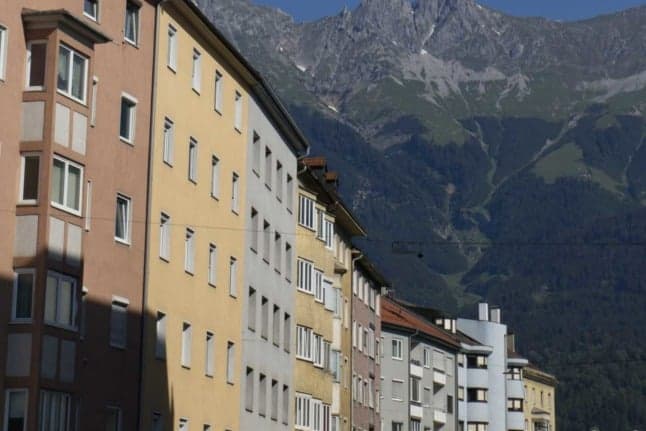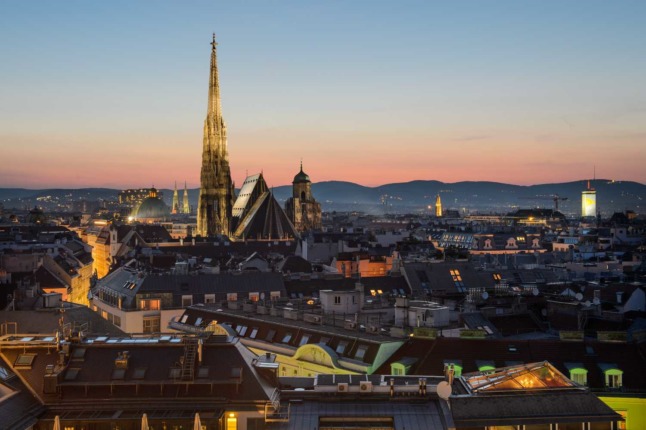Property in Austria: A roundup of the latest news and info

Stay up-to-date on the latest Austrian property news with The Local's weekly roundup.
Thinking of buying a house, moving house, investing or just curious about the property market in Austria?
Here's our first edition of our weekly property wrap.
No sign of a price drop in the Austrian property market
Since the start of the pandemic last year, property prices in Austria have continued to increase with no sign of it slowing down yet.
Raiffeisen Research expects prices in the real estate market to keep rising throughout 2021 and interest rates are not expected to increase until 2025.
As a result, demand remains high among investors and private buyers with a recent survey by real estate broker Interhyp AG revealing 73 percent of tenants want to own property.
This coincides with results from the Property Index 2021 by Deloitte that shows new apartments in Austria are the most expensive in Europe at €4,457 per square metre – an increase of 5.84 percent from last year.
This means a 70 square meter apartment costs an average of 10.6 times the national annual salary.
Gabriele Etzl, real estate expert and partner at Jank Weiler Operenyi / Deloitte Legal, said: “Despite the year of the Corona crisis, housing prices in Austria continue to rise.
“The rising construction costs and the high attractiveness of real estate as an investment form are the main reasons for this price development.
“At the moment everything indicates that this trend will intensify in the next few months.”
READ MORE: New apartment prices in Austria are highest in Europe
The Austrian National Bank recently warned of overheating in the property market but other experts, like Michael Haller, CEO at Hypo Vorarlberg Bank, are not worried about a possible risk for investors.
Instead, Haller told ORF he expects prices will soon stabilise at the current rate, “with slight fluctuations upwards or downwards” after that.
Additionally, Andreas Luschnig, Manager of Interhyp in Vienna, told the Salzburger Nachrichten that this is a good time to consider housing finance as interest rates remain low.
The cost of renting in Austria is going up
According to the Kronen Zeitung, “private sector rents have exploded” in Vienna with a square metre now costing on average €10.
This means landlords are receiving 50 percent more in rent than they were 10 years ago.
An increase in rent prices in Austria’s capital city is not restricted to the private sector either, with the municipal sector going up by 23 percent and cooperatives by 29 percent in the past 10 years.
FOR MEMBERS: ANALYSIS: Where are real estate prices on the rise in Austria?
However, Innsbruck has been named as the most expensive city in Austria for rent following a study by Immowelt. In Innsbruck, the average rent is €18,80 per square meter.
Towns in the east of Austria, such as Jennersdorf in Burgenland, are the cheapest places to rent where people pay less than €7 per square meter.
Salzburg is the second most expensive city for rent in Austria at €16,0 per square meter.
In July of this year, the average rent price in Austria rose by 1.2 percent due to inflation.

Is it still possible to find a bargain in the Austrian capital of Vienna? Photo by Geula Prochazka on Unsplash
The luxury homes market is booming
The luxury homes property market has performed well throughout the pandemic as wealthy buyers search for more space and a quieter lifestyle outside of the main cities.
This is being driven by a move towards remote work and wealthy Austrian citizens overseas looking for a new base in their home country, according to an article in Der Standard.
Real estate agents in Austria are also reporting an increase in enquiries from people in Germany searching for a luxury home in Salzburg or the surrounding area.
READ MORE: Can foreigners buy property in Austria?
Another article highlighted the luxury property market in the Kitzbühel district of Tyrol, which has increased by 20 percent since the start of the pandemic.
Mortgage Broker Manfred Hagsteiner told Der Standard that some houses are selling for up to €25 million and that the ceiling on prices “has still not been reached”.
Earlier this year, Peter Marschall, CEO at Marschall Real Estate, told The Local that German buyers have been flocking to Kitzbühel in Tyrol due its close proximity to Munich.
“People want to own a second home in a nice area,” he said.
“The crisis has highlighted these areas to international buyers more than Vienna.”
Did you know?
The City of Vienna has a rent calculator for tenants to find out if they are paying too much rent and might be due a refund.
Rent in Vienna is famously affordable due to rent control rules on buildings built before 1945 which are smaller than 131m2. These high-ceilinged buildings are also known as Altbau.
However, experts predict that 80 percent of tenants could be paying too much rent to live in these properties.
The rent calculator can be found at the City of Vienna website.
FOR MEMBERS: How to find out if you are paying too much rent in Vienna
The property roundup is new addition and we’d welcome any feedback or suggestions for areas it should cover. Please email us at [email protected]
Comments
See Also
Thinking of buying a house, moving house, investing or just curious about the property market in Austria?
Here's our first edition of our weekly property wrap.
No sign of a price drop in the Austrian property market
Since the start of the pandemic last year, property prices in Austria have continued to increase with no sign of it slowing down yet.
Raiffeisen Research expects prices in the real estate market to keep rising throughout 2021 and interest rates are not expected to increase until 2025.
As a result, demand remains high among investors and private buyers with a recent survey by real estate broker Interhyp AG revealing 73 percent of tenants want to own property.
This coincides with results from the Property Index 2021 by Deloitte that shows new apartments in Austria are the most expensive in Europe at €4,457 per square metre – an increase of 5.84 percent from last year.
This means a 70 square meter apartment costs an average of 10.6 times the national annual salary.
Gabriele Etzl, real estate expert and partner at Jank Weiler Operenyi / Deloitte Legal, said: “Despite the year of the Corona crisis, housing prices in Austria continue to rise.
“The rising construction costs and the high attractiveness of real estate as an investment form are the main reasons for this price development.
“At the moment everything indicates that this trend will intensify in the next few months.”
READ MORE: New apartment prices in Austria are highest in Europe
The Austrian National Bank recently warned of overheating in the property market but other experts, like Michael Haller, CEO at Hypo Vorarlberg Bank, are not worried about a possible risk for investors.
Instead, Haller told ORF he expects prices will soon stabilise at the current rate, “with slight fluctuations upwards or downwards” after that.
Additionally, Andreas Luschnig, Manager of Interhyp in Vienna, told the Salzburger Nachrichten that this is a good time to consider housing finance as interest rates remain low.
The cost of renting in Austria is going up
According to the Kronen Zeitung, “private sector rents have exploded” in Vienna with a square metre now costing on average €10.
This means landlords are receiving 50 percent more in rent than they were 10 years ago.
An increase in rent prices in Austria’s capital city is not restricted to the private sector either, with the municipal sector going up by 23 percent and cooperatives by 29 percent in the past 10 years.
FOR MEMBERS: ANALYSIS: Where are real estate prices on the rise in Austria?
However, Innsbruck has been named as the most expensive city in Austria for rent following a study by Immowelt. In Innsbruck, the average rent is €18,80 per square meter.
Towns in the east of Austria, such as Jennersdorf in Burgenland, are the cheapest places to rent where people pay less than €7 per square meter.
Salzburg is the second most expensive city for rent in Austria at €16,0 per square meter.
In July of this year, the average rent price in Austria rose by 1.2 percent due to inflation.

The luxury homes market is booming
The luxury homes property market has performed well throughout the pandemic as wealthy buyers search for more space and a quieter lifestyle outside of the main cities.
This is being driven by a move towards remote work and wealthy Austrian citizens overseas looking for a new base in their home country, according to an article in Der Standard.
Real estate agents in Austria are also reporting an increase in enquiries from people in Germany searching for a luxury home in Salzburg or the surrounding area.
READ MORE: Can foreigners buy property in Austria?
Another article highlighted the luxury property market in the Kitzbühel district of Tyrol, which has increased by 20 percent since the start of the pandemic.
Mortgage Broker Manfred Hagsteiner told Der Standard that some houses are selling for up to €25 million and that the ceiling on prices “has still not been reached”.
Earlier this year, Peter Marschall, CEO at Marschall Real Estate, told The Local that German buyers have been flocking to Kitzbühel in Tyrol due its close proximity to Munich.
“People want to own a second home in a nice area,” he said.
“The crisis has highlighted these areas to international buyers more than Vienna.”
Did you know?
The City of Vienna has a rent calculator for tenants to find out if they are paying too much rent and might be due a refund.
Rent in Vienna is famously affordable due to rent control rules on buildings built before 1945 which are smaller than 131m2. These high-ceilinged buildings are also known as Altbau.
However, experts predict that 80 percent of tenants could be paying too much rent to live in these properties.
The rent calculator can be found at the City of Vienna website.
FOR MEMBERS: How to find out if you are paying too much rent in Vienna
The property roundup is new addition and we’d welcome any feedback or suggestions for areas it should cover. Please email us at [email protected]
Join the conversation in our comments section below. Share your own views and experience and if you have a question or suggestion for our journalists then email us at [email protected].
Please keep comments civil, constructive and on topic – and make sure to read our terms of use before getting involved.
Please log in here to leave a comment.